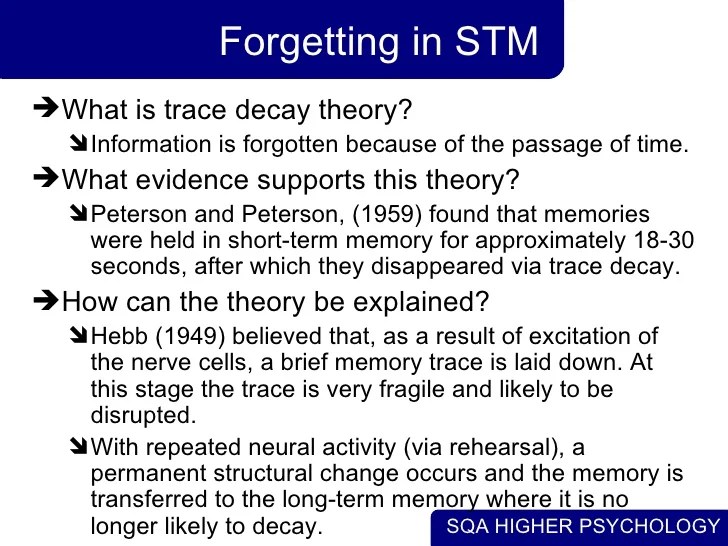Featured
- Get link
- X
- Other Apps
Decay Theory Of Forgetting In Psychology
Decay Theory Of Forgetting In Psychology. Evaluation of decay theory • time does appear to be a factor in forgetting in sensory memory and short term memory. Evaluation, ao3 of the interference theory.

Decay theory has long been rejected as a mechanism of long term forgetting. The quarterly journal of experimental psychology, 10, 12. This theory was accompanied by experiments showing forgetting in a short amount of time, whereas previous work.
The Main Assumption Is That Forgetting Depends Crucially On The Length Of The Retention Interval Rather Than On What Happens During The Time Between Learning And Test.
The decay theory is a theory that proposes that memory fades due to the mere passage of time. The inability to retrieve a memory is one of the most common causes of forgetting. Which of the following statements is true of the decay theory of forgetting in psychology?
The Decay Theory Of Forgetting.
Evaluation of decay theory • time does appear to be a factor in forgetting in sensory memory and short term memory. It is the length of time the information has to be retained that is important. B.) it was proposed as an additional mechanism to explain forgetting.
C.) It Assumes That Memory Traces Disintegrate Over Time.
Decay theory, metabolic processes occur over time which cause the engram (memory trace) to degrade unless maintained by rehearsal, causing the memory. The quarterly journal of experimental psychology, 10, 12. In order to eliminate rehearsal.
Proactive Interference (Or Proactive Inhibition) Occurs When Material That Was Learned In The Past Impedes The Learning Of New Material.
Information is therefore less available for later retrieval as time passes and memory, as well as memory strength, wears away. Trace decay theory various theorists, including ebbinghaus (1885/ 1913) have argued that forgetting occurs because there is spontaneous decay of memory traces over time. Evaluation, ao3 of the interference theory.
The Simplicity Of The Theory Works Against It In That Supporting Evidence Always Leaves Room For Alternative Explanations.
Trace decay theory of forgetting the trace decay theory was formed by american psychologist edward thorndike in 1914, based on the early memory work by hermann ebbinghaus. In this work, brown proposed a theory of forgetting based upon memory traces that lose activation, or decay, with the passage of time. If the information is not retrieved and rehearsed, it will eventually be lost.
Comments
Post a Comment